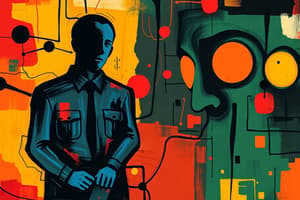Podcast
Questions and Answers
What does Eysenck suggest plays a vital role in predisposing individuals to crime?
What does Eysenck suggest plays a vital role in predisposing individuals to crime?
- Heredity (correct)
- Personal relationships
- Cultural background
- Social learning experiences
Which theory posits that individuals learn criminal behavior through specific forms of learning?
Which theory posits that individuals learn criminal behavior through specific forms of learning?
- Labeling theory
- Learning theory (correct)
- Biological theory
- Control theory
How does classical conditioning relate to criminal behavior according to the content?
How does classical conditioning relate to criminal behavior according to the content?
- It pairs unwanted behavior with reinforcement.
- It associates unwanted behavior with punishment. (correct)
- It promotes positive reinforcement of good behavior.
- It encourages individuals to repeat desirable actions.
What element is central to control theory in explaining antisocial behavior?
What element is central to control theory in explaining antisocial behavior?
Which aspect of emotional deficiency is often linked to violent behavior?
Which aspect of emotional deficiency is often linked to violent behavior?
What is a primary feature of social learning in the context of criminal behavior?
What is a primary feature of social learning in the context of criminal behavior?
In terms of operant learning, what factor most strengthens criminal behavior?
In terms of operant learning, what factor most strengthens criminal behavior?
Which type of theory emphasizes the importance of the label in predicting behavior?
Which type of theory emphasizes the importance of the label in predicting behavior?
What is one of the key components necessary for observational learning according to Bandura?
What is one of the key components necessary for observational learning according to Bandura?
Which type of model is NOT considered a social context for modeling aggression?
Which type of model is NOT considered a social context for modeling aggression?
What does differential association theory emphasize as a cause of delinquency?
What does differential association theory emphasize as a cause of delinquency?
According to the learning theories presented, which factors are crucial in the learning of criminal behavior?
According to the learning theories presented, which factors are crucial in the learning of criminal behavior?
What is a significant criticism of social learning theory regarding violence?
What is a significant criticism of social learning theory regarding violence?
Which of the following does NOT influence antisocial behavior according to environmental cues?
Which of the following does NOT influence antisocial behavior according to environmental cues?
What statement best describes the role of intimate groups in the context of criminal behavior learning?
What statement best describes the role of intimate groups in the context of criminal behavior learning?
What do models and cues lead to in the context of learning criminal behavior?
What do models and cues lead to in the context of learning criminal behavior?
What is the primary focus of criminology?
What is the primary focus of criminology?
Which of the following is a belief of the positivist school of criminology?
Which of the following is a belief of the positivist school of criminology?
What is the main goal of rehabilitation in the context of crime?
What is the main goal of rehabilitation in the context of crime?
Under the classical school of criminology, which concept is emphasized?
Under the classical school of criminology, which concept is emphasized?
Which factor is NOT related to the early theories of crime?
Which factor is NOT related to the early theories of crime?
What does deterrence in the context of criminal justice primarily focus on?
What does deterrence in the context of criminal justice primarily focus on?
Who believed that crime occurred more often in specific geographic areas and under certain social conditions?
Who believed that crime occurred more often in specific geographic areas and under certain social conditions?
In the classical school of criminology, what is the implication of free will?
In the classical school of criminology, what is the implication of free will?
Flashcards
Social Process Theories of Crime
Social Process Theories of Crime
These theories explain crime as a result of learning and social interactions, focusing on how individuals acquire criminal behavior and how society controls it.
Learning Theory (Crime)
Learning Theory (Crime)
Individuals learn criminal behavior through various forms of learning.
Control Theory (Crime)
Control Theory (Crime)
People commit crimes unless social controls, internal (conscience) and external (rules), prevent them.
Social Labeling Theory
Social Labeling Theory
Signup and view all the flashcards
Operant Learning
Operant Learning
Signup and view all the flashcards
Classical Conditioning (Crime)
Classical Conditioning (Crime)
Signup and view all the flashcards
Social Learning (Crime)
Social Learning (Crime)
Signup and view all the flashcards
Eysenck's Theory on Crime
Eysenck's Theory on Crime
Signup and view all the flashcards
Social Learning Theory
Social Learning Theory
Signup and view all the flashcards
Differential Association
Differential Association
Signup and view all the flashcards
Differential Association Reinforcement
Differential Association Reinforcement
Signup and view all the flashcards
Social Cognitive Theory
Social Cognitive Theory
Signup and view all the flashcards
Criminal Behavior Technique
Criminal Behavior Technique
Signup and view all the flashcards
Criminal Motivations
Criminal Motivations
Signup and view all the flashcards
Environmental Cues for Criminal Behavior
Environmental Cues for Criminal Behavior
Signup and view all the flashcards
Policy Implication
Policy Implication
Signup and view all the flashcards
Criminology
Criminology
Signup and view all the flashcards
Rehabilitation
Rehabilitation
Signup and view all the flashcards
Retribution
Retribution
Signup and view all the flashcards
Deterrence
Deterrence
Signup and view all the flashcards
Classical School of Criminology
Classical School of Criminology
Signup and view all the flashcards
Positivist School of Criminology
Positivist School of Criminology
Signup and view all the flashcards
Quetelet's Contribution
Quetelet's Contribution
Signup and view all the flashcards
Lombroso and Garofalo's Research
Lombroso and Garofalo's Research
Signup and view all the flashcards
Study Notes
Criminology
- Behavioral scientists study crime and criminal behavior, focusing on crimes feared by most, as well as the overall origins, manifestations, and societal impact of crime. Juveniles and young adults often commit a large number of violent offenses.
Why Crime Happens
- Rehabilitation: Aims to treat individuals and eliminate the root causes of crime.
- Retribution: Punishes offenders proportionally to the severity of the crime.
- Deterrence: Primarily focuses on certainty and severity of punishment rather than rehabilitation.
Early Theories
- Religious Theories: Sin is believed to be a cause of crime.
- Classical School of Criminology (17th Century): Advocates for proportional punishment fitting the crime, emphasizing free will, choice, and the consequences of actions.
Positivist School of Criminology
- Focuses on factors influencing criminal behavior, arguing that criminal behavior is determined, rather than chosen freely.
- Seeks to understand crime via scientific method and empirical data.
- Quetelet, Lombroso, and others studied geographical locations and social circumstances to find correlations to crime rates.
Contemporary Theoretical Frameworks of Crime
- Sociological Theories: Emphasize external social and cultural factors influencing crime, rejecting the idea that criminals are inherently different from non-criminals.
- Structural Explanations: Dysfunctional social arrangements (e.g., poor schooling, economic hardship) contribute to criminal behavior.
- Differential Opportunity: Inequalities in opportunity to achieve societal goals contribute to crime.
- Anomie: A state of normlessness where lack of social control and unlimited aspirations lead to deviance and crime.
- Subcultural Explanations: Focus on clashes between dominant societal norms and values, and those of specific cultural groups (e.g., gangs). Crime is a manifestation of conflicts and differences in norms.
- Rational Crime Theory: Asserts criminal behavior makes sense when weighing potential rewards against risks.
- Strain Theory: Suggests that societal pressures, particularly differing socioeconomic status and limited opportunities, lead to frustration and potential criminal behavior.
Psychological Theories
- Psychodynamic Theory: Early childhood experiences influence an individual's likelihood of committing crimes.
- Behavioral Theory: Crime is learned through observation and modeling. Criminal behavior is learned through social interactions
- Cognitive Theory: Examines how individuals mentally perceive and represent the world around them, and how this affects their tendency to commit crimes. Cognitive processes of criminals may differ from those of non-criminals.
Personality Based Explanations
- Psychopathy: Defined by traits like lack of empathy, insensitivity, callousness, and impulsivity.
- Antisocial Personality Disorder:Characterized by deceitfulness, manipulativeness, and lack of remorse, and a disproportionate involvement in violent crime.
Social Learning Theory
- Crime is learned through observation, modeling, and reinforcement.
- Techniques, direction of motives, and attitudes towards criminal behavior are influenced by social interactions, values, and attitudes.
Control Theories
- Control Theories: Focus on factors that prevent individuals from engaging in criminal behavior.
- Reckless' Containment Theory: External and internal controls that help individuals from committing crimes.External controls include societal rules. Internal controls include a sense of self-discipline.
Social Labeling Theory
- Social labeling theory: Society's reaction to a criminal act (primary deviance) can lead to further criminal behavior (secondary deviance) due to labeling and stigmatization.
Biological Theories of Crime
- Biological theories: Explore the potential relationship between individual characteristics and criminality; while acknowledging multiple factors contributing to crime.
- Chemical imbalances/Genetic factors: Some research explores the possibility of correlations between biological factors and a predisposition toward criminal behavior.
Studying That Suits You
Use AI to generate personalized quizzes and flashcards to suit your learning preferences.




